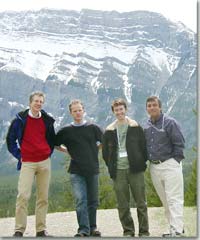Sergio Ulloa

Sergio posing with some international colleagues.
Like many physicists, Sergio Ulloa loves constantly learning new things. Ulloa, a condensed matter theorist at Ohio University, has recently been studying quantum dots, tiny nanometer scale blobs of semiconductor. Quantum dots are small enough that quantum mechanical effects are important, but larger than atoms, and therefore in some ways easier to study. Physicists wanted to know what happens when you confine electrons to smaller and smaller dimensions, says Ulloa, so they started making these quantum dots in the early 1980s.
“People have called these artificial atoms, and in many respects they are, but they're also unlike atoms,”says Ulloa, “many of the simple rules that one learns from atomic physics don't quite apply.” He's studying the interactions of electrons in these dots, trying to sort out what rules do apply.
Electrons have a property called spin, somewhat analogous to the spinning of a top. Ulloa seeks to determine how electrons in quantum dots maintain their spin, and whether and how scientists could control those spins. If scientists can learn to understand and manipulate the spins, they could eventually use quantum dots in quantum computers, though Ulloa is quick to point out that no one is on the verge of building a quantum computer any time soon.
In addition to his work on quantum dots, Ulloa has recently become interested in molecular electronics. Scientists can now actually pass current through a single molecule, and Ulloa investigates how electrons interact with vibrations of molecules. The work includes modeling how long floppy molecules respond differently to current than short rigid ones. With these studies, he says, “We're going back to chemistry, but with a different eye, a different attitude, because we have new tools and new understanding.”
These projects exemplify the constant learning and discovery that Ulloa loves about science. “This is one of the great things about physics: making new discoveries, new insights. Once you understand it better you see the world differently,” he says. Some people might find it disconcerting to continually have to learn new things, says Ulloa, but that's what fascinates him about his subject. Whether it's a small discovery or a large one, or simply the realization that he doesn't quite understand something, Ulloa, like many scientists, is continually learning.
In addition to discovering new properties of the physical world, Ulloa finds that physics has enabled him to discover new cultures in the course of traveling around the world and exchanging ideas with physicists from many countries.
Ulloa was born in Mexico City in 1955. He says he was fortunate to get a good education, and had the benefit of an energetic middle school teacher who got him fired up about physics. Though he was nearly turned off by a bad teacher in high school, Ulloa majored in physics as an undergraduate at the National University of Mexico in Mexico City--with an entering class of about 400 physics students-- then went on graduate school at the State University of New York at Buffalo.
Though Buffalo was a bit of a shock, both culturally and because of the weather, Ulloa felt he was ready to live away from his home country, and says people he met were always friendly and welcoming.
Over his career he has had the chance to travel, meeting and collaborating with scientists around the world. He says travel allows him to learn about new cultures and languages, an experience he finds particularly stimulating. Ulloa has noticed that he often has a lot in common with other physicists, including similar ways of thinking, but he still has to adapt to different cultures. “When we travel we try to make things fit into a perspective of the world that we have, but many times you find that is not the real thing, and you have to adjust your thinking,” he says, “That discovery is quite interesting.”











